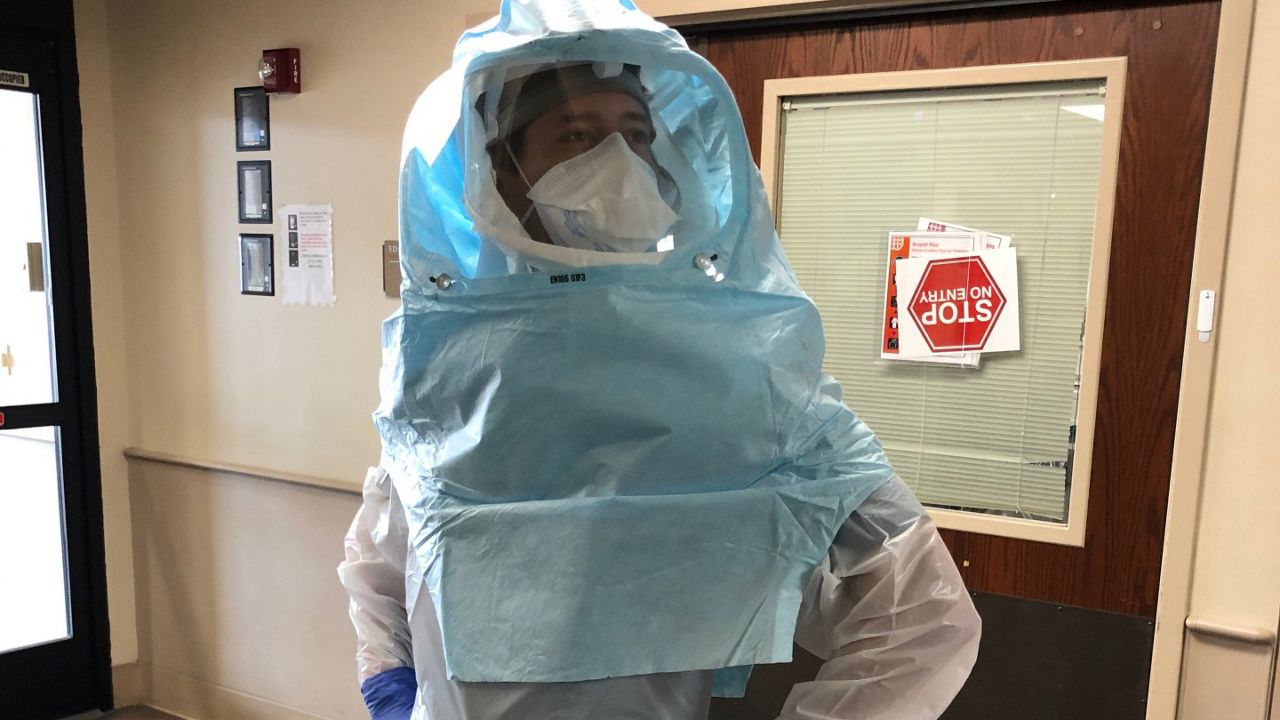DALLAS — The internet has become an incubator for false information about — well, everything — but especially anything related to the COVID-19 vaccine. Misinformation can metastasize with every push of the “share” button on social media. Even when the facts seem obvious, a false claim repeated enough times can start to make sense to even the most ardent skeptic.
By now, we’ve all heard the rumors about the vaccines: They contain dangerous material; you can’t get pregnant after being inoculated; death is a side effect; and so on. To clear up the myths surrounding these potentially life-saving medicines, Spectrum News spoke to Dr. James Cutrell, an infectious disease expert at U.T. Southwestern in Dallas.
The following was conducted during a phone interview. Some of Cutrell’s answers have been edited for clarity, but the bulk of what he said remains untouched. The myths he addresses were culled by a reporter from various internet forums and social media posts and do not represent the opinions or beliefs of Spectrum News.
Cutrell: That’s a myth. Originally, I think this was based on some individuals who thought that a part of the mRNA sequence was similar to … a protein that then pulled the placenta, but there's no evidence to show any effect of the vaccine on women's fertility. And, in fact, although women who were known to be pregnant were not included in the studies, there were a small number of women who actually became pregnant after enrolling in the vaccine trial. They were [tracked] and there was no concerning outcomes with their pregnancy reported.
Cutrell: That's not correct. Currently, the CDC is recommending that even individuals who've had COVID-19 still get the vaccine. This is because after people have had a normal or natural COVID infection, the antibody response and the duration of your immunity can vary. And so the vaccine does appear to provide additional immune protection, even in people who've recovered from COVID-19 infection.
Now … they definitely need to wait until they're recovered from their acute COVID illness and they are no longer considered contagious or infectious. But after that, there's no minimum duration that they have to wait. Their risk of reinfection after having COVID in the first 90 days is pretty low, so they can decide to delay up to 90 days after they recover from COVID, but we would still recommend that they get the COVID-19 vaccine because it’s safe and we do believe it provides some additional protection.
Cutrell: That's not true. The vaccine trials were very large and had the same rigor of any of the vaccines that have been approved. Both the Pfizer and Moderna vaccine trials were studied in over 30,000 patients and were shown to be highly effective as well as very safe. Now, there’s a few reasons why we were able to develop these vaccines quicker than any prior vaccines. No. 1, there was a lot already known about the SARS Coronaviruses from SARS CoV-1. We already knew which part of the virus, namely the spike protein, was most important to target with our vaccine. No. 2, … right after the virus was sequenced and discovered back in January, vaccine manufacturers were able to start working on the vaccines very quickly.
No. 3, what the government, through Operation Warp Speed and other programs, did was they went ahead and supported and paid to go ahead and start the manufacturing process while the vaccines were still in clinical trials. So, they basically took a financial risk saying, 'We're going to go ahead and mass produce these vaccines before we know whether or not they're safe and effective.’ But they were not slated to be distributed to anyone until those trials were completed. And we had the scientific proof that they were safe and effective. So no corners were cut in the study of the vaccine.
Cutrell: Right now, we're not recommending that, and that's because — although the vaccines have proven very effective at preventing you from getting symptomatic COVID-19 infection or from requiring hospitalization or dying from COVID — we don’t yet know how effective the vaccines are at reducing asymptomatic infection or your risk of transmitting to other individuals. While we certainly hope that at some point, once a high enough percentage of the population has gotten vaccinated, that we'll be able to step back on some of those precautions, right now, we're still recommending that the individuals who've been vaccinated still wear their mask, wash their hands, and practice some of the same precautions. It is likely that, over time, individuals, if they're in small groups with everyone who's been fully vaccinated that will be safe. But in terms of just never wearing a mask or following the precautions, that will come, but not yet.
Cutrell: That’s not correct. So all the vaccines that we use right now are mRNAa, meaning they just have a part of the genetics of the virus that gives them instructions to our own cells to make the spike protein, but they do not contain any live virus. It’s impossible for you to get COVID-19 from any of the current COVID vaccines.
Cutrell: The vast majority of the side effects that we see from the COVID-19 vaccine are what we call a reactogenicity —meaning either local site reaction, like arm pain, occasional redness, or swelling — or systemic symptoms, like body aches, chills, headaches, and in some small percentage of people, fevers. These are actually signs that the immune system is responding the way we want — mounting a good antibody and immune response. But in terms of long-term effects from the vaccine, it appears to be very safe, and those seem to be very rare. The usual side effects that people have are short, limited. They can take Tylenol or over-the-counter medications to treat them but shouldn't have long-term effects at all.
Cutrell: No. The mRNA does get into the outer part of your cell, which is called the cytoplasm, which is where your body uses that to make copies of the coronavirus spike protein. But the mRNAs cannot get into your nucleus, which is at the center of your cells, which is where our own DNA is. So the mRNA and a vaccine cannot alter our own DNA in any way.
Cutrell: Although these are the first vaccines that have made it all of the way to emergency use authorization, the mRNA platform and technology has actually been in study for about a decade, with other viruses, as well as cancer vaccines, and other types of therapies. We have about 10 years or so of experience and safety with this. So it's not brand new. And these are actually fully synthetic vaccines, so no fetal tissue or other things like that were used in the the manufacturing or creation of these vaccines. They basically are just mRNA, which is genetic material. And then the lipids that are used to make the lipid nanoparticle that kind of protects the mRNA in the vaccine until it gets to your cell.
Cutrell: Most of the viral tests that we use to diagnose a COVID infection — or what we call PCR test or antigen tests — will not be positive based on the fact that you've got a COVID vaccine. Now, there are tests out there that test for COVID antibodies. Most of the COVID antibody tests that are in commercial use test for other parts of the virus, like the nucleocapsid, which is a different protein. And so those antibody tests will only be positive if you've had COVID infections. They'll be negative if you've just had the vaccine. There are a few commercial tests that are against the spike protein. And so if you've got a spike protein antibody tests, that will be positive, whether you've had the vaccine or whether you've had COVID infection. But the vast majority of the tests that are out there will not be positive just based on having had the vaccine.
Cutrell: Not necessarily. I think definitely the mRNAs platform has some real advantages. I'm sure that will be studied for other types of infections. But the Coronavirus had a very attractive and easy to target protein, the spike protein, that's essential for the virus to get into cells. Other types of infections, like HIV or other things like that, may be more complicated for us to develop vaccines and an effective immune response to. So it's not a guarantee that the same vaccine technology will work against any type of infection that we try to target.
Cutrell: The vaccine is still effective against many of the variants. For example, the U.K. variant of the vaccine appears to be fully protective against that. Some of the other new variants, like the one first seen in South Africa or in Brazil, may have some partial reduction in effectiveness from the vaccine. Having said that, the vaccines that are currently available still appear to be 100% protective against severe disease, hospitalization, and death — even against the new variant. Even if it’s still possible that you may be able to get infected with some of these new variants after the vaccine, it still looks like they're good at protecting against hospitalization or death.







